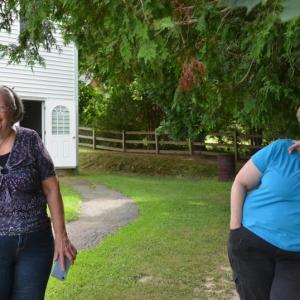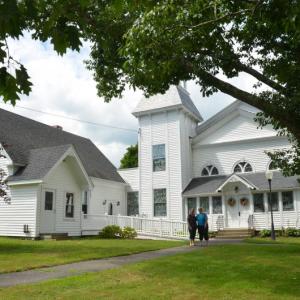Feisty team sticks to mission of helping Castle Builders construction victims
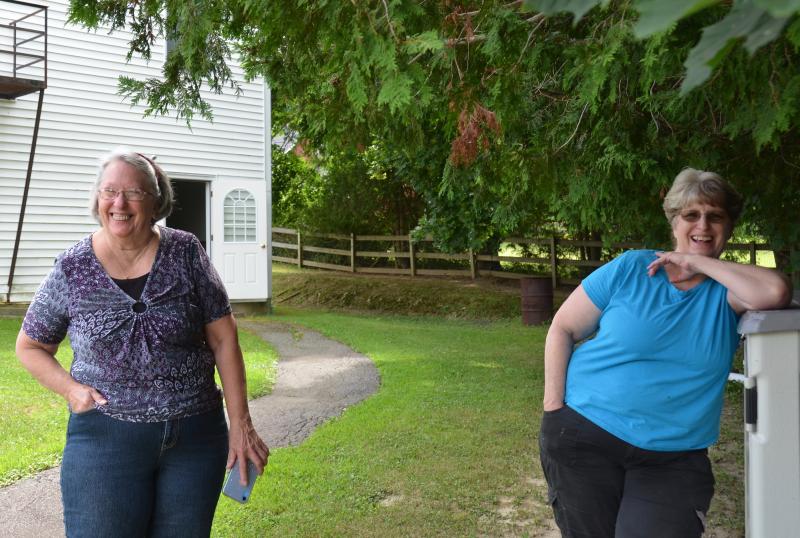 Pat Weaver, of Warren, and Robin Milliken, of Union, are not giving up the fight to help the victims who lost money when they made payments on contractor work that was never completed, or was shoddily done. (Photo by Lynda Clancy)
Pat Weaver, of Warren, and Robin Milliken, of Union, are not giving up the fight to help the victims who lost money when they made payments on contractor work that was never completed, or was shoddily done. (Photo by Lynda Clancy)
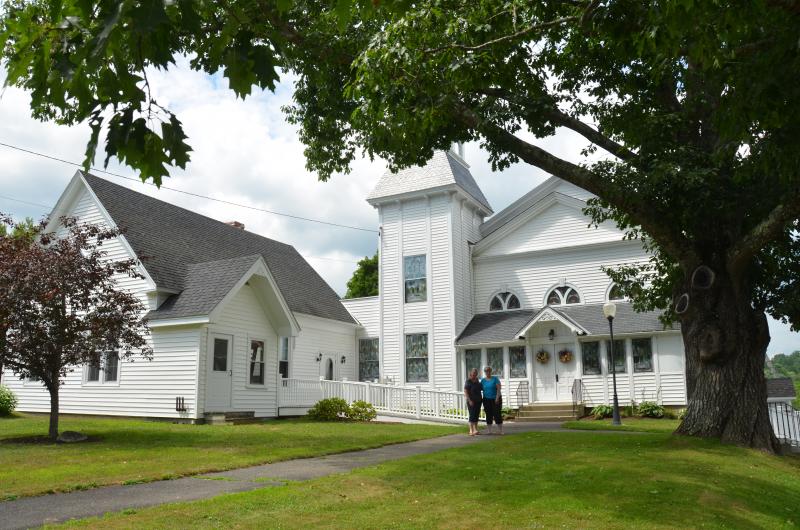 The Second Congregational Church in Warren Village.
The Second Congregational Church in Warren Village.
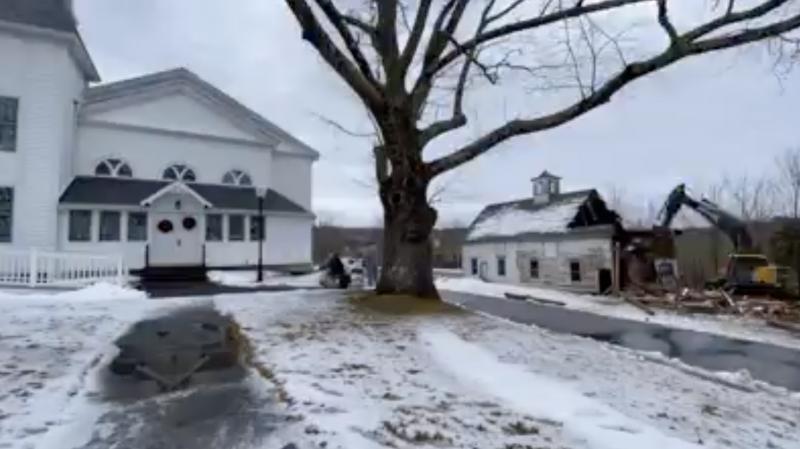 The January 2020 demolition of the Second Congregational Church of Warren was captured on time-lapsed video. Click here to watch the full job (photo and video courtesy Hope Creighton): facebook.com/SecondCongregational/videos/?ref=page_internal
The January 2020 demolition of the Second Congregational Church of Warren was captured on time-lapsed video. Click here to watch the full job (photo and video courtesy Hope Creighton): facebook.com/SecondCongregational/videos/?ref=page_internal
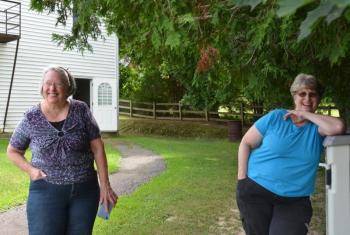 Pat Weaver, of Warren, and Robin Milliken, of Union, are not giving up the fight to help the victims who lost money when they made payments on contractor work that was never completed, or was shoddily done. (Photo by Lynda Clancy)
Pat Weaver, of Warren, and Robin Milliken, of Union, are not giving up the fight to help the victims who lost money when they made payments on contractor work that was never completed, or was shoddily done. (Photo by Lynda Clancy)
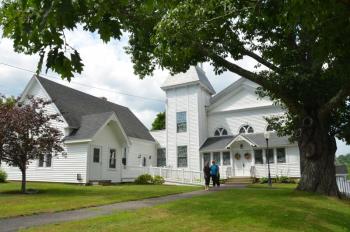 The Second Congregational Church in Warren Village.
The Second Congregational Church in Warren Village.
 The January 2020 demolition of the Second Congregational Church of Warren was captured on time-lapsed video. Click here to watch the full job (photo and video courtesy Hope Creighton): facebook.com/SecondCongregational/videos/?ref=page_internal
The January 2020 demolition of the Second Congregational Church of Warren was captured on time-lapsed video. Click here to watch the full job (photo and video courtesy Hope Creighton): facebook.com/SecondCongregational/videos/?ref=page_internal
WARREN — Robin Milliken and Pat Weaver are salt of the earth Maine women — smart, with with a lot of common sense, and humor. Together, their laughter shakes the steeple at the Second Congregational Church of Warren. But when they learned that no was coming forward to help victims of last fall’s Castle Builders business debacle, sparks flew.
With little faith that the State of Maine will lend a hand, they have taken it upon themselves to keep on the front burner the matter of those left financially adrift by a distressed construction company that shuttered its business with no forewarning last fall.
“I want to get peoples’ attention that these people are in a mess,” said Milliken, who has been advocating since last September for those who put down money in good faith with Castle Builders, Inc. — for a new roof, convert a bathroom for the handicapped, replace kitchen cabinets, and a multitude more of residential projects — only to learn that the money had evaporated and no work would be done.
“A lot of the people are elderly and are veterans and disabled veterans,” she said.
Castle Builders, then based in Union, abruptly closed its doors in early September 2019. In the wake were property owners who had paid deposits for repairs, renovations or new houses, as well as 22 employees out of a job, and business creditors.
The Maine State Attorney General took on the case, filing a civil action in Knox County Court against Castle Builders, Inc., and its owners, Malcolm and Elizabeth Stewart, in late December. Maine Attorney General Aaron Frey contended that Castle Builders had allegedly violated the Maine Unfair Trade Practices Act, and cited deceptive and unfair business practices.
"This is a particularly egregious example of a business using deceptive marketing to take advantage of Maine consumers," said Frey, on December 20. “My office has listened to numerous stories from individuals who were wronged by Castle Builders, and we are seeking justice on their behalf.”
The lawsuit sought a permanent injunction against the Stewarts to prohibit them from soliciting or contracting with consumers for home construction services in Maine, restitution for consumers who suffered financial loss caused by their alleged unlawful practices, civil penalties and attorney's fees.
But nine months later, little has changed for those whom Frey call consumers.
According to the AG’s office, 47 complaints had been received, ranging from those who paid upfront for work never completed, to shoddy work, with homes damaged and left unprotected from rain and snow.
“Consumers who hired Castle Builders were required to pay a down payment of at least one-third of the contract price when the contract was signed, another one-third at the start of the job, and the balance upon completion,” said the AG’s office, in December.
Robin Milliken, co-owner of SBR Homes, in Union, knows that many of those who suffered do not know how to advocate for themselves.
But the chances of recouping any money that victims expended when they signed a contract with Castle Builders are slim.
The Stewarts filed for bankruptcy, and left for South Carolina. The AG’s office continues to argue in Knox County District Court against the defendants and has asked for a default judgment, citing a lack of response from the Stewarts.
The Stewarts, on the other hand, stated on July 13 that they did respond in March, by appealing the charges brought by the suit.
They wrote: “The defendants are convinced that the court is going to waste its time holding a hearing to hear evidence regarding the total amount of the judgement to only be reversed by the Law Court upon appeal because the complaint response exists and was serviced upon the state and filed in the court in a timely manner.”
In the in U.S. Bankruptcy Court in Bangor, the Castle Builders’s petition for bankruptcy under Chapter 7 has moved slowly, as the list of creditors attached to that case is long. There have been a number of meetings of the creditors, the last one in June.
AG Frey said in December: “The pending bankruptcy will not impact the Attorney Generals’ action.”
But to all that court business, Milliken just rolls her eyes.
She has no expectations that money will be returned, which is why she and Weaver are strategizing other ways to fund the victims, or help them get their projects completed.
“I realized the fight is for the people,” Milliken told herself last winter.
Just a few days before COVID-19 sequestering hit Maine, she started fundraising with a community supper. Then, because of the pandemic, those traditional fundraising efforts were tabled and have yet to again be standard practice. Communities have had to get more creative.
In January, Milliken’s efforts took a turn when the Second Congregational Church of Warren heard about the Castle Builders case.
Over the winter, the church was grappling with a hard decision: The parsonage and the barn behind it, all which sat next door to the church, were in rough shape. It would cost $250,000 to rehabilitate them, the trustees had learned. And so, the congregation decided to tear the buildings down.
Weaver went to trustees, proposing that, with all the beautiful fixtures – a fireplace mantel, cabinets, floors, and a lot of antiques — why not sell them, “to take some cost and poundage,” said Weaver.
The church began getting calls from people redoing their own homes.
“Then all of a sudden, she showed up,” said Weaver, grinning at Milliken, on a hot July afternoon, nine months after they first met.
“I was trying to find free and low-cost items to help people,” said Milliken. “The next thing I know, they [the church] are telling me, ‘it’s yours.’”
Milliken had relayed to Weaver her attempts to help the victims of Castle Builders, and she hoped to get building materials for them from the parsonage tear-down. Weaver went back to the church trustees.
“Take what you want, as long as you use it to help other people,” the church decided, in support of Milliken’s efforts. “Tell these people if they are ever fixing up stuff to donate it back to the church.”
What goes around, comes around. And Weaver is happy the demolition materials from the parsonage and barn are getting recycled and reused.
“I didn’t want to see this stuff destroyed,” she said. “I wanted to see this parsonage and barn and live on.”
Word spread, and as the church and barn were demolished in early January, effort was made to preserve the assets. Peter Overlock, who was driving the big equipment, took the rafters and beams out with great care.
“He saved as much of the barn as he possibly could,” said Weaver. “Then, on the last day, Channel 13 arrived.”
The television station produced a piece on how the church was donating to Milliken’s efforts to help the victims.
After that, “Robin got a phone call from a veteran,” said Weaver. “’You are trying to help a scammed veteran?’ the person asked. I called him back.”
The caller turned out to be a retired Green Beret chaplain, who had once been a parachutist and had seen a lot in his career.
“Quite the interesting man,” said Weaver. “He decided he wants to make the other veteran whole and gave him money for what he was scammed.”
That gift was for a bathroom repair.
“And now, the bathroom is going to be completely fixed,” said Weaver, who released to funds to the Waldoboro veteran on July 20. “It will be safe.”
But she and Milliken want to up the ante and grow their support for the ones who still have outstanding home repairs to make.
“I am on the board of the Area Interfaith Outreach Food Pantry and people have been very generous in their donations due to the virus,” she said. “I don’t know why we can’t do the same thing with Castle Builders victims. We are hoping to generate some more donations to help these people.”
For Milliken, the hunt for funding and building materials for the construction victims continues. And, she wants better protection for Maine citizens who give down payments to building contractors.
“Maine does not license home construction contractors so consumers must proceed with caution when hiring a contractor,” said Frey, in his December announcement of the civil suit against Castle Builders. “Ask your friends and family for the names of people who have done good work for them. Check references and do some research to determine if the contractor is reputable or has many complaints. Also, read Chapter 17 of the Attorney General’s Consumer Law Guide, which has information on Maines law governing home construction and repair contracts, and what you can do if you’re not satisfied with the contractors work.”
To get better statute protections in place is a different battle. Today, it is about helping those whose homes aren’t repaired.
“We need to make as many people as possible whole so they can live safely in their homes,” Milliken said.
Reach Editorial Director Lynda Clancy at lyndaclancy@penbaypilot.com; 207-706-6657
Event Date
Address
United States

